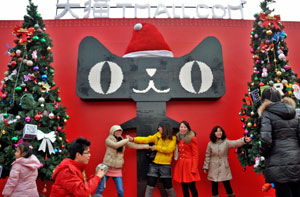
Chinese hard liquor Moutai is vying for a place on the world's luxury product list. The Moutai Group is reportedly in discussion with the World Luxury Association for its application.
If Moutai gets there, it would be the first world-class Chinese luxury brand.
The World Luxury Association will hold a grand party for world-class luxury products in Beijing later this month. It will publish a list of its top 100 luxury brands. A list of made-in-China luxury products, too, is expected to be published, celebrating China's accession to the World Trade Organization just over 10 years ago.
A bottle of Moutai was selling for 1,998 yuan ($316) in 2010 compared with 959 yuan the previous year, and its retail price was only 200-300 yuan a decade ago.
More than 100 bottles of bonded Moutai, the Chinese liquor served on official occasions and at State banquets, were sold for 5.22 million yuan at a liquor auction in Shanghai in February 2010.
The Moutai Group needs to produce 30,000 tons of liquor a year to meet consumers' (or, should we say, connoisseurs') demand. But its annual output is just more than 10,000 tons now.
A brand should be taken as a luxury product if it is sold at a price - before tax - that is higher than the monthly per capita wages of a country. This is one of the World Luxury Association's criteria for luxury brands. By this standard, Moutai's prohibitively high price should make China's national liquor a luxury.
Moutai, brewed in a small town in Guizhou province, has been considered the country's top brand of liquor and a status symbol for decades.
But Moutai is not fighting alone for a place on the world's luxury product list. In cooperation with the World Luxury Association, the China Council for the Promotion of International Trade established the China Luxury Trade Commission on June 9, 2011, which is supposed to find the Chinese producers of luxury goods and help them establish their presence overseas.
But this is not just an issue of whether China should have its own luxury brands. According to a research conducted by market research agency Millward Brown and media company WPP on the top 50 most valuable Chinese brands, 83 percent of consumers beyond China's borders couldn't recall a Chinese brand or company. So what does such a label mean for Moutai - or China? Does the strategy to develop Chinese luxury brands make sense?
Luxury goods are products and services that are non-essential. What China needs to develop is branded rather than luxury products. And China has a lot of catching-up to do even for branded products.
Creating and sustaining brands in developed markets is a complex, expensive and uncertain process. It took years, and a great deal of money, for giant Japanese and South Korean consumer electronics companies to establish themselves abroad.
Some Chinese companies have already begun to gain a foothold overseas, learning the ins and outs of selling their products in the developed markets. Haier, China's largest appliance-maker, is selling small refrigerators under its own name in the United States. Lenovo, the country's largest computer-maker, has made itself a global brand for overseas expansion.
China has a large and growing pool of skilled engineers and the money to invest in new products. Makers of branded goods can charge higher prices partly because they promise higher quality, which remains a crucial issue for Chinese companies that have the ambition to establish a presence in the developed markets.
Whether a product is a luxury brand is not determined by its price alone, but by consumers' judgment, according to the World Luxury Association. So Moutai has a long way to go to meet this end overseas.
Moutai has enough reason to become a luxury product. But the government should think twice before developing Chinese global luxury brands.
The author is a senior writer with China Daily.
 Winter fishing festival marked in NE China
Winter fishing festival marked in NE China
 Railway to create network of 'city clusters'
Railway to create network of 'city clusters'
 Have fun with Tmall's Lego mascot
Have fun with Tmall's Lego mascot
 Playing at Ice and Snow World in Harbin
Playing at Ice and Snow World in Harbin
 Santa is coming and China takes more notice
Santa is coming and China takes more notice
 Doodle-design subway station for Chongqing passengers
Doodle-design subway station for Chongqing passengers
 Snow tourism flourishes in China's Snow Town
Snow tourism flourishes in China's Snow Town
 Green Christmas
Green Christmas